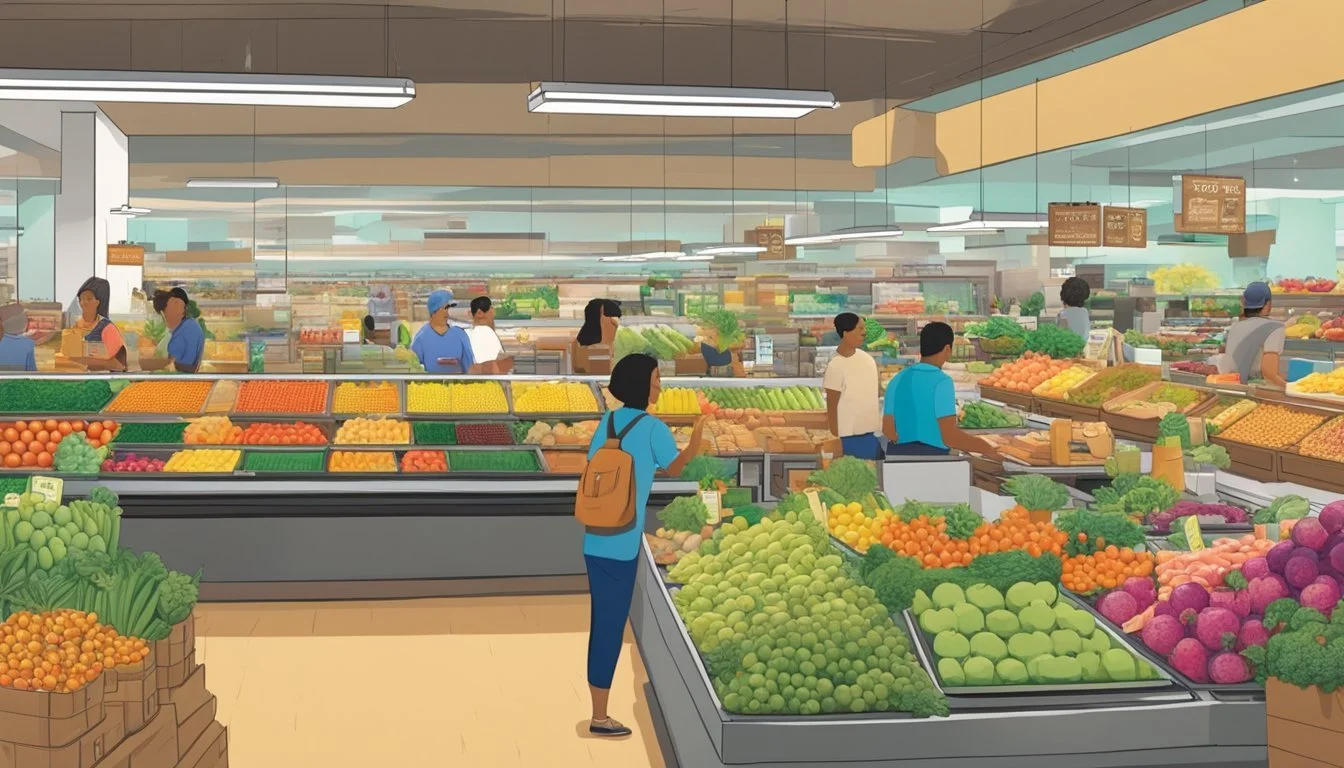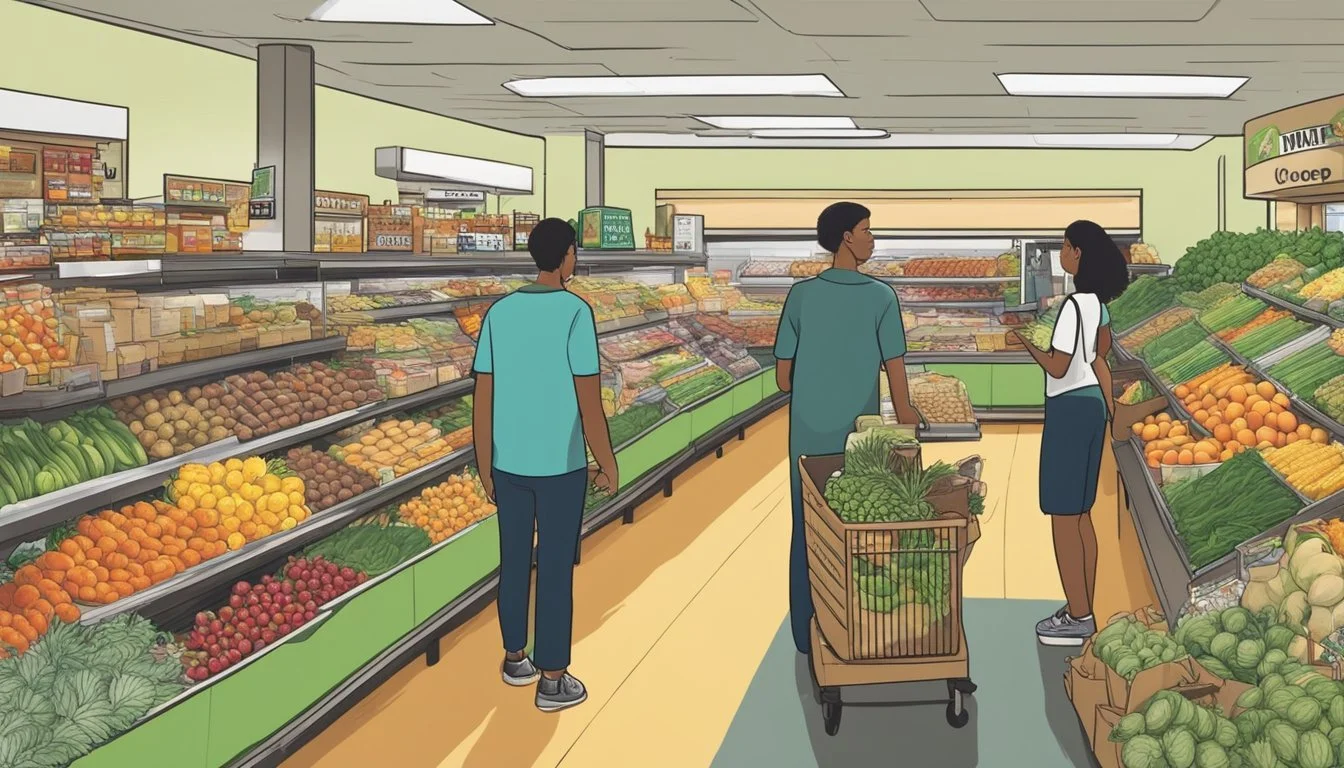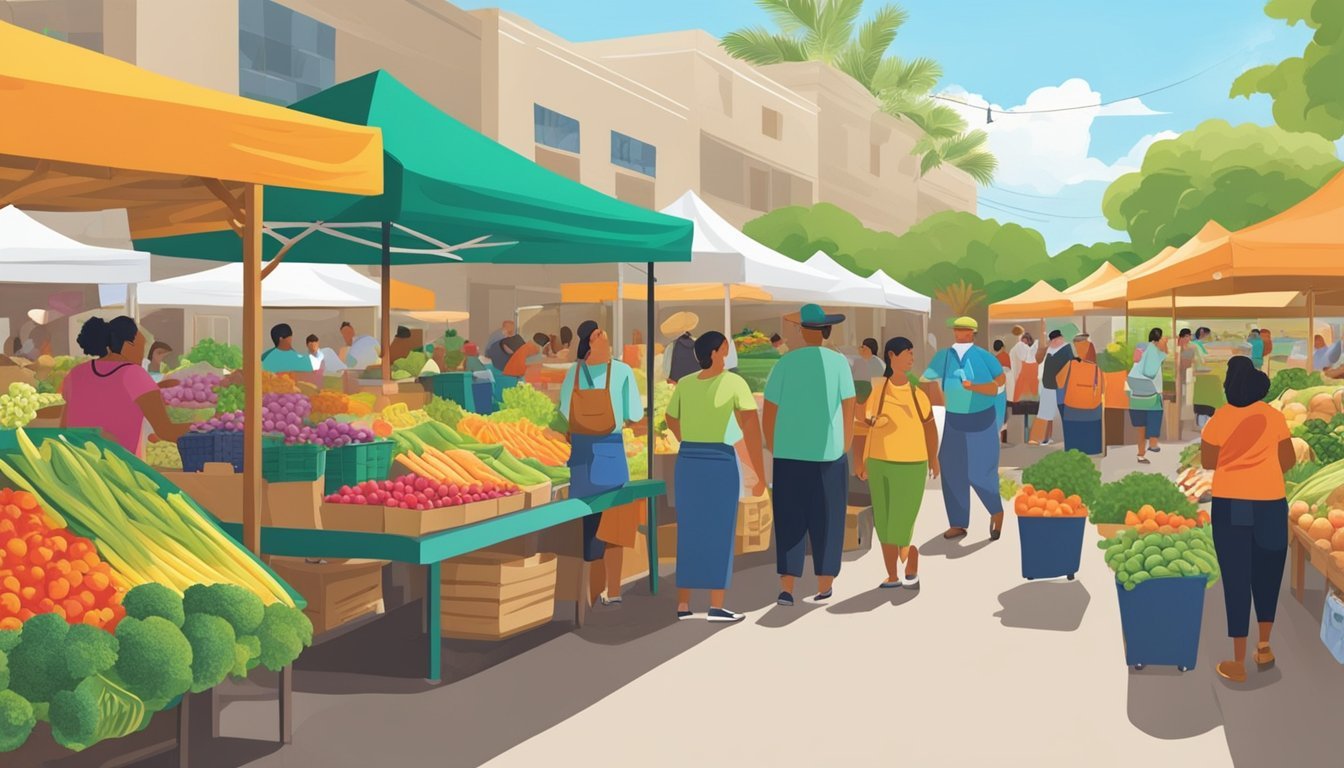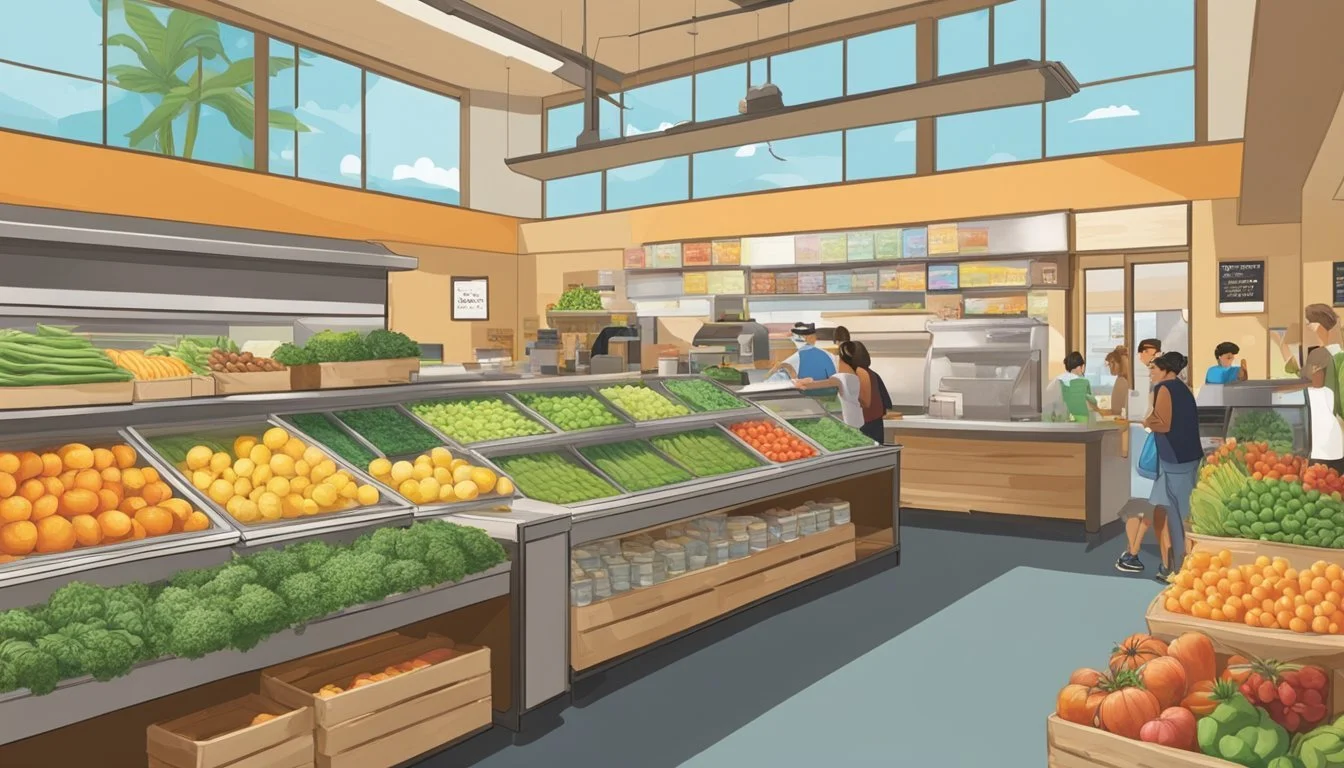Guide to Food Co-Ops in Honolulu, HI
Your Access to Local and Organic Produce
Food cooperatives, or co-ops, offer a distinct approach to food retail and provide Honolulu residents with a community-centric alternative. These member-owned organizations prioritize local goods and sustainable practices, embodying a shared commitment to health and community well-being. In Honolulu, a city celebrated for its vibrant culinary scene and cultural diversity, food co-ops serve as hubs for locals to access organic, health-conscious, and eco-friendly products.
The first food cooperative in Honolulu, Kokua Market, paved the way for a movement towards collaborative and conscious consumption. Co-ops operate on a consensus-driven model where members have a say in the products stocked and the values upheld by the establishment. This collaboration ensures the alignment of the co-op's offerings with the community's preferences for healthy and sustainable food options.
As these establishments gain traction, they spark a symbiotic relationship between local producers and consumers. Honolulu's food co-ops offer a unique experience by not only providing access to locally-sourced produce but also by fostering a sense of ownership and connection among its members. This contributes to a resilient local food economy and a closer-knit community that supports its own.
Understanding Food Co-Ops
In Honolulu, food co-ops offer more than just grocery shopping; they're hubs for community engagement and promoters of a sustainable food system.
What Is a Food Co-Op?
A food co-op, or cooperative, is a retail entity that is owned and democratically controlled by its members. These members may be customers, employees, or residents of the local community. Unlike traditional supermarkets, a co-op is oriented around service to its members rather than the maximization of profits. In Honolulu, food co-ops like Kokua Market function as pillars for local food purchasing and shared ownership in the local economy.
Cooperative Principles
Food co-ops are guided by a set of principles that ensure they operate for the benefit of their members:
Voluntary and Open Membership: Anyone can join without discrimination.
Democratic Member Control: Members have equal voting rights (one member, one vote).
Member Economic Participation: Members contribute equitably and control capital democratically.
Autonomy and Independence: Co-ops are self-sufficient and controlled by their members.
Education, Training, and Information: Co-ops provide education and training for members to contribute effectively to the development of their cooperative.
Cooperation among Cooperatives: Co-ops serve their members most effectively by working together.
Concern for Community: While focusing on member needs, co-ops work for the sustainable development of communities through policies approved by the members.
Benefits of Joining a Food Co-Op
Members benefit from joining a co-op through access to high-quality, sustainably sourced food, and a say in how the store is run. They often enjoy better prices on organic and local products, strengthening the local economy through their support of local producers. Food co-ops are typically nonprofit organizations, meaning they can focus more on community empowerment and less on generating profits for distant shareholders. Volunteering at a co-op can also provide a sense of community and belonging, as it directly contributes to the sustainability and strength of the cooperative business model.
How to Become a Member
Becoming a member of a food cooperative in Honolulu, HI is an opportunity to invest in one's community and gain access to healthy, sustainable food. It involves a straightforward sign-up process and comes with various benefits for the owner members.
Membership Types
Membership offerings typically vary between co-ops but generally involve a financial investment into the cooperative. For example, Kokua Market in Honolulu allows individuals to become an owner by investing in the co-op. This ensures that members have a stake in the cooperative and can influence its direction.
Sign-Up Process
To sign up for membership at a Honolulu food co-op, one needs to visit the co-op in-person:
Visit the Co-op: Prospective members often must stop by the store to begin the sign-up.
Customer Service Desk: Approach the customer service desk for assistance with the sign-up.
Capital Investment: Pay a refundable Capital Investment, which might amount to $100 plus a nominal join fee.
Monthly Payments: Opt for monthly payments until the total investment is completed, if available.
Owner Benefits
Members usually receive a variety of benefits that may include:
Discounts: Members can often enjoy discounts on products.
Voice: Ownership gives a say in co-op decisions.
Security: Investment in a co-op is typically refundable, providing a measure of financial security.
By joining a food co-op, members not only gain access to quality food but also contribute to a sustainable local economy. Members play a pivotal role in shaping the cooperative's future while enjoying the inherent benefits of their investment.
Local Food Co-Ops in Honolulu
Honolulu offers a range of local food co-ops that primarily focus on providing fresh, sustainable, and often organic food options. These establishments often source produce from local farms and may support area restaurants with quality ingredients.
Popular Honolulu Co-Ops
One of the well-regarded food co-ops in Honolulu is Down to Earth Organic & Natural, which receives appreciation for its vegetarian, vegan, and eco-friendly options. Another notable co-op is Kokua Market, recognized as Honolulu's first and only natural foods co-op, emphasizing community ownership and access to healthy foods.
Hawaii 'Ulu Cooperative
Hawaii 'Ulu Cooperative, with a focus on the traditional Hawaiian breadfruit known as 'ulu, illustrates the successful amalgamation of over 80 member farms across Hawaii's islands. By offering peeled, cooked, and frozen 'ulu, the co-op supports both local agriculture and a revival of indigenous food sources.
The Food Basket
The Food Basket serves as an integral part of the Honolulu community, functioning as more than just a market. It operates on a system of shared values and a commitment to providing access to nutritious food, helping to nurture a healthier, more sustainable food ecosystem in partnership with local farmers and consumers.
Shopping at Food Co-Ops
Shopping at food co-ops in Honolulu offers diverse product selections emphasizing fresh, healthy food options. They often cater to those on a budget, providing discounts and accepting SNAP benefits for eligible items.
Product Range
At Honolulu food co-ops, customers can expect to find a wide array of products, often surpassing the typical offerings of conventional grocery stores. They typically stock:
Local Produce: A plethora of fruits and vegetables sourced from local farms.
Dairy Products: A selection of milk, cheese, and other dairy items.
Meat Options: Various cuts and types of meat, often from local or sustainable sources.
Finding Fresh and Healthy Options
Food co-ops prioritize health and sustainability, making it easier for customers to find fresh and healthy food choices. They are known for:
A commitment to freshness: Ensuring that produce and perishable goods are restocked regularly.
Specializing in healthy food: Ranging from organic to non-GMO and vegan options.
Discounts and SNAP Benefits
For shoppers on a budget or using EBT, food co-ops offer:
Discount Programs: Reduced prices for members or during certain sales events.
SNAP Benefits: Acceptance of EBT cards for SNAP-eligible products, helping extend access to quality food for those in need.
Community Impact and Involvement
Food co-ops in Honolulu play a pivotal role in strengthening the community's cohesion, empowering the local economy, and promoting sustainable food practices. These spaces are not just retail hubs but also centers for social and educational growth.
Volunteering and Community Building
Volunteers are the heartbeat of food co-ops, providing hands-on assistance that ranges from managing daily operations to organizing community events. Kokua Market, as Honolulu’s pioneering food co-op, relies on its member-owners to foster a shared vision for healthy food and sustainable living. Volunteers here gain a sense of belonging and contribute to a community that values inclusivity and mutual aid.
Supporting Local Economy and Farmers
By prioritizing the procurement of local produce, food co-ops like Kokua Market inject vital revenue into Hawaii's agricultural sector. This, in turn, supports local farmers and ranchers, keeping the economy resilient. The "Double Up Food Bucks" initiative, which operates under the name DA BUX in Hawaii, exemplifies this by matching SNAP benefits dollar-for-dollar on local produce, effectively doubling the economic impact.
Education and Events
Co-ops serve as educational platforms, where members can learn about nutrition, food security, and sustainable agriculture. Regular events and workshops, often led by figures like Dana Shapiro of Hawai'i's local reporting sector, provide invaluable knowledge to consumers. Sharing insights about the origins of food helps to enhance the community’s understanding of their impact on the environment and local economy.
Sustainability and Food Security
In Honolulu, HI, the thrust for a sustainable food system goes hand in hand with enhancing food security. These aims address environmental health, economic viability, and social equity within the food domain.
Promoting Sustainable Practices
Honolulu's food co-ops are pivotal in fostering sustainable food systems by sourcing from local producers and prioritizing organic products. They emphasize reducing food miles and greenhouse gas emissions, a direct response to the fact that over 80% of Hawaii’s food is imported, a stark figure underscoring the islands' vulnerability to external shocks.
The co-ops exemplify sustainable practices by:
Buying locally to minimize transportation and support area farmers.
Encouraging low-input farming techniques that reduce the dependency on chemical fertilizers and pesticides.
Food Security During the Pandemic
The COVID-19 pandemic underscored the fragility of Hawaii's food supply chains, with food co-ops playing a crucial role in maintaining access to essentials. They quickly adapted to safe distribution methods and bolstered community resilience.
During the pandemic, co-ops were instrumental in:
Circulating local produce, which kept supply chains active despite global disruptions.
Educating consumers on the importance of local sustenance for food security during such crises.
Breadfruit and Local Alternatives
Breadfruit has emerged as a symbol of self-reliance and an alternative to imported staples, aligned with Hawaii’s rich cultural heritage. Co-ops have increasingly focused on breadfruit due to its versatility and sustainability attributes.
By championing local alternatives like breadfruit, food co-ops contribute to a diverse, locally attuned food system that supports:
Food sovereignty by reducing import-dependence.
The cultivation of indigenous crops that are better adapted to Hawaii's environment.
Food co-ops in Honolulu are at the forefront of integrating sustainability and food security into the community's daily life, offering a blueprint for a resilient local food system.
Challenges Facing Food Co-Ops
Food co-operatives in Honolulu face numerous hurdles that affect their operation and sustainability. These challenges range from financial constraints to intense competition, which can impact their ability to provide healthy food options to the community.
Economic Challenges
Economic difficulties are a significant obstacle for food co-ops. These cooperatives often operate on tight budgets, which can limit their ability to expand inventory or invest in marketing strategies. Funding is a constant concern, with startups relying on member contributions, loans, and occasionally, grants. Additional expenses such as rent in high-cost areas of Honolulu, coupled with a commitment to offering healthy food, often at a higher cost of acquisition, can strain financial resources.
Competition with Larger Grocery Stores
Competition from larger grocery chains presents another formidable challenge. Big retailers benefit from economies of scale, allowing them to offer lower prices due to bulk purchasing. Food co-ops typically have less buying power, making it harder to match the prices of these competitors. They must find inventive ways to attract customers, such as providing unique local products or creating a strong sense of community.
Maintaining Member Engagement
Member engagement is the backbone of the cooperative model, yet sustaining active participation is difficult. In order for a co-op to thrive, there needs to be a continuous effort in involving members not only as consumers but also as active participants in governance and volunteer activities. A decline in engagement can weaken collective strength and shared responsibility, essential characteristics that differentiate co-ops from other business models.
Future of Honolulu Food Co-Ops
Honolulu's food co-ops stand on the brink of transformative growth, driven by a focus on local, sustainable food systems and innovative technology that meets evolving community expectations.
Trends and Growth Predictions
The trajectory of food co-ops in Honolulu is expected to rise, with an emphasis on regenerative farming practices and community-driven initiatives. The local food movement gains momentum, influencing Honolulu's co-ops to stock a richer variety of locally sourced products. This shift not only backs local farmers but also attracts a larger customer base deeply invested in the communal and environmental benefits of a sustainable food system.
The Role of Technology
Technology in the food co-op space is projected to improve supply chain efficiency and enhance customer experience. Through sophisticated inventory systems, co-ops can ensure consistent availability of fresh, local produce. Furthermore, digital platforms for online ordering and member communication bolster the accessibility and convenience for consumers, aiding co-ops in their mission to serve the community effectively.
Community Expectations
Members of Honolulu's co-ops anticipate a future where their food shopping aligns with their values. They expect co-ops to advocate for sustainability, health, and nutrition. Integration of programs like "Double Up Food Bucks" demonstrates a commitment to making healthy, sustainably produced food accessible to all community members, amplifying the role of food co-ops as pivotal actors in Honolulu's evolving food narrative.








